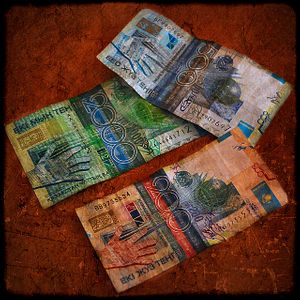In mid-September, KASE, Kazakhstan’s Stock Exchange, halted trades for shares of Astana Banki, a mid-sized lender. The following week, on September 18, the Central Bank stripped Astana Banki’s license. The decision echoed actions taken against Eximbank and Qazaq Banki, which had their licenses revoked at the end of August. The regulator’s axe targeted the banks that President Nursultan Nazarbayev had singled out during an April meeting with Central Bank chief Daniyar Akishev.
While the government seems to have given up on some of the smaller lenders, the response to Tsesnabank’s liquidity problems was quite different.
On September 25, the country’s stock exchange said the state-owned Nonperforming Loans Fund sold 450 billion tenge (around $1.3 billion) in 10-year bonds at 9 percent interest. The Fund is a company established to help commercial banks clean up toxic assets from their accounts. The sole buyer of the bond issue was, in all likelihood, the Single Pension Fund, another state-owned entity.
Earlier in September, due to liquidity problems, Tsesnabank, the second-largest bank in Kazakhstan, asked both the government and its shareholders to intervene. On September 6, the Central Bank gave out a 150 billion tenge short-term loan to Tsesnabank. One week later, the shareholders injected 40 billion tenge into the bank’s capital. In the days following the bond issue by the Nonperforming Loans Fund, Tsesnabank sold around 300 billion tenge of its agricultural loan portfolio to government agencies. On October 3, it issued a bond prospectus for 500 billion tenge at the stock exchange. The Fund should buy these bonds, experts said.
Elite politics was playing out in the background of these decisions. On September 10, Adilbek Dzhaksybekov, head of the presidential administration, was replaced by ex-mayor of Astana Asset Issekeshev. Dzhaksybekov’s family owns Tsesna Group, an industrial holding focusing on agriculture that owns Tsesnabank. Ostensibly, President Nazarbayev terminated Dzhaksybekov because he had reached pension age. On the same day, however, the former chief of staff became Tsesnabank’s chairman. A few days later, Ulf Wokurka, ex-Kazkommertsbank, was appointed CEO of the bank.
The fate of Dzhaksybekov’s political career only symbolically reflected that of his bank, Rassul Rysmambetov, a financial consultant in Almaty, told The Diplomat.
“The bank’s problems have little to do with its shareholder. The bank’s policy was just too risky. Tsesnabank holds at least 50 percent of agricultural lending. Its involvement in agriculture is absolutely strategic; letting it fall would lead a large chunk of the sector to bankruptcy. Now, I think Dzhaksybekov will continue to stay away from the bank and its operations,” Rysmambetov said.
The reorganization of the bank and the public financing it received seemed to be linked to Dzhaksybekov’s ousting. Tsesnabank denied it will benefit from an investment from the Single Pension Fund. But it confirmed that the Nonperforming Loans Fund bond issue was directly related to the 450 billion tenge buyout of agricultural loans that the government pledged in mid-September.
The Nonperforming Loans Fund, created in the wake of the Global Financial Crisis of 2007, helped the country’s two largest lenders, Kazkommertsbank and Halyk Bank, to refinance some of their toxic loans in 2015. In 2017, the Fund’s management was transferred from the Central Bank to the Ministry of Finance. Halyk completed its takeover of Kazkommertsbank in July 2018.
In the past couple of years, the Nonperforming Loans Fund also took care of a couple of smaller assets. In 2017, it sold half of its shares in Al Saqr Finance, an Islamic Bank, to Astana Banki. In 2018, it exited Al Saqr, selling its 50 percent share to Chingiz Kusegenov, a little-known businessman. Curiously, on the board of Al Saqr, a bank that purports to be among the first to function according to Islamic financial rules, sat two relatives of Patokh Chodiev and Alijan Ibragimov, who form the “Kazakh Trio” together with Aleksander Mashkevich. The Kazakh Trio owns mining and industrial projects, as well as banks.
In 2017, the Fund became the sole shareholder of the recently-formed Estate Management Company, a real estate dealer focused on private and business areas of Almaty, Kazakhstan’s largest city. At the time of the company’s creation in 2016, its owners were Rollan Dogambekov and Timur Naizabekov, two managers affiliated with Kazkommertsbank’s acquisition of BTA Bank. They sold their shares to BTA Bank, which in turn sold it to the Nonperforming Loans Fund. In essence, the Fund became a vehicle to clean up some of the toxic assets at BTA after it had changed ownership.
Closely linked to the banking sector, the Nonperforming Loans Fund was instrumental in executing the government’s strategy to effectively bail out Tsesnabank. Last year, the bank was close to buying a large minority stake in Bank CenterCredit, a top five lender in Kazakhstan. The deal was called off in March this year, as the country’s financial sector suffered a liquidity crunch. Then all government agencies, from the Central Bank to the Nonperforming Loans Fund, threw their weight behind the mission to save Tsesnabank.
On October 2, Standards and Poor’s confirmed its B rating, with negative outlook, for Tsesnabank “on the assumption that the government will redeem a part of the bank’s loan portfolio.” And there is little that hints otherwise after the bailout. “If it looks like a bailout [and] smells like a bailout, then it’s a bailout. There was no way the government would let Tsesna stumble,” Rysmambetov said.
The acrobatic feats around Kazakhstan’s banking sector in September seem to indicate that the financial circus will continue to play out for months to come.

































